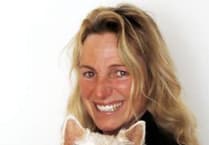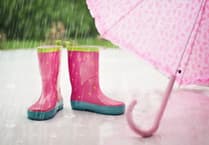Nature may have been kind gifting us with a long, mild and gentle autumn but it doesn’t take long to change all that. As Bert certainly did - and hot on the heels of Jack Frost. One weekend I was working in a t-shirt admiring out-of-season blooms and the following week saw me unable to get into my truck until 9 am as it was ‘locked’ with frost, and Llangattock and Crickhowell became islands with all roads in and out under water.
It is a reminder of what a powerful ‘boss’, the weather is, and the respect we should have for it. As Giulio Boccaletti, former Chief Strategy Officer & Global Ambassador for Water wrote recently for The Nature Conservancy, “There is no doubt humanity has inflicted untold damage on the world’s ecosystems. Our footprint is everywhere. As modernity chips away at the last great wild places, cutting down forests, polluting rivers, and spreading invasive species, the fossil fuels that power its march burn up the sky, altering the chemistry of the atmosphere, shifting the energy balance of the planet. Homo sapiens is the only species in Earth’s long history to have been able to fundamentally alter the geochemical cycles that regulate the planet in a mere few decades.
The narrative of nature’s fragility misses something important. Nature has agency. Nature acts on the planet on a scale that dwarfs most human processes. The Earth’s powerful climate system is a case in point. The impact it has on every person in the world makes clear one basic fact: We are small, we are fragile, we are the ones at risk.
One of its principal components, the hydrological cycle of the planet, for example, is a system of extraordinary complexity and power. The energy released over the course of a few days by a single hurricane is equivalent to that used by the entire world economy in a year. And that is a single storm. For all of our ingenuity and power, recent human actions are a perturbation on the vast and complicated machine that is the Earth.
The camera needs to turn around. Nature is looking at us. We are the fragile creatures that have chosen to undermine the very foundation that keeps our home from collapsing. We are the unwitting victims of our own success.”
A friend recently recommended the book ‘Life After Doom: Wisdom and Courage for a World Falling Apart.’ It is a challenging read and in fact the author warns: “If you are already on the edge of a narrow ledge of anxiety and depression because of personal challenges, illnesses or grief, this book is not for you, at least not right now. You have enough on your plate and this book will still be here when you have less on your plate.”
He also notes, “Many of our friends and family may not seem very concerned. They think there is something seriously wrong with anyone who would pick up a book called ‘Life After Doom’. They see our sense of dread as a character flaw or even a mood disorder.”
Prior to this read, I have just finished a book about ‘expectations forming your future’, which you may think would result in me avoiding a book on ‘doom’, but it’s all about perspective. After so many of my conversations ending with, ‘The world’s going mad’, reading this book made me want to ‘live now’ and enjoy whatever it is we do have left.
Despite her mood swings, I will continue to spend as much time as possible out in nature, working alongside her in various gardens and guises – and writing about it all.




